Academics
MA & PhD in Architecture
UCLA Architecture and Urban Design offers two academic graduate degrees: the Master of Arts in Architecture (MA) and Doctor of Philosophy in Architecture (PhD).
The programs produce students whose scholarship aims to provoke and operate within architecture’s public, professional, and scholarly constituencies. Both programs are supported by the Standing Committee, made up of six faculty members: Michael Osman (MA/PhD program director), Cristóbal Amunátegui, Dana Cuff, Samaa Elimam, Salmaan Craig, and Ayala Levin. A number of visiting faculty teach courses to expand the range of offerings.
Applications for the MA/PhD program (Fall 2026 matriculation) are completed via the UCLA Application for Graduate Admission, and are due January 6, 2026. Candidates will be notified of decisions in March 2025; admitted candidates who wish to accept the offer of matriculation must submit their Statement of Intent to Register (SIR) by April 15, 2026.
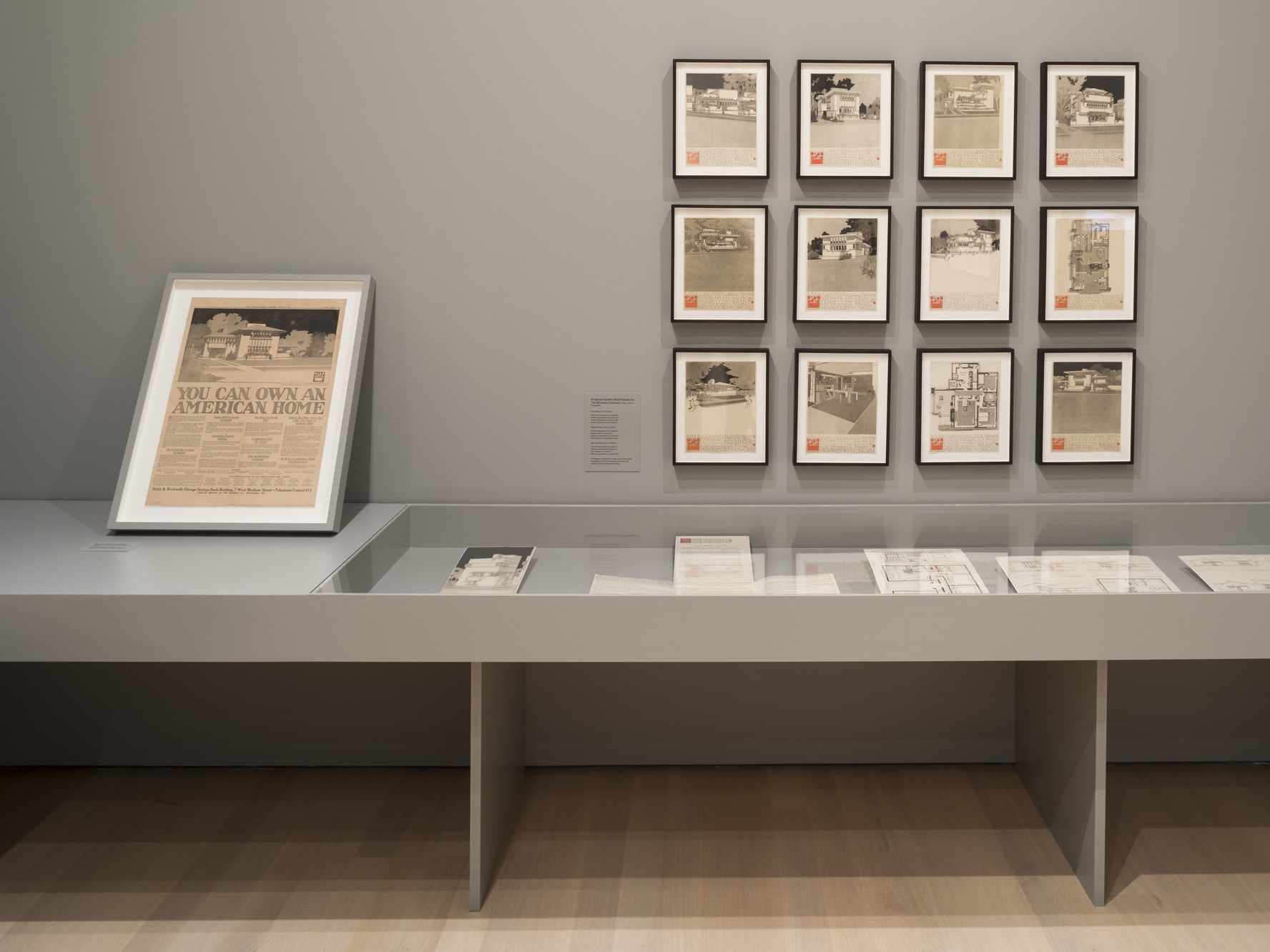
Colloquium
All MA and PhD students are required to enroll in a two-year colloquium focused on methods for writing, teaching, and researching in the field of architecture. The six courses that constitute the colloquium train students in the apparatus of academic scholarship. Over the two-year sequence, students produce original research projects and develop skills in long-format writing.
Research Opportunities
The intellectual life of the students in the MA and PhD programs are reinforced by the increasing number of opportunities afforded to students through specialized faculty-led research projects. These include cityLAB-UCLA and the Urban Humanities Institute.
MA in Architecture
This program prepares students to work in a variety of intellectual and programmatic milieus including historical research, cultural studies, and interdisciplinary studies with particular emphasis on connections with geography, design, art history, history of science and literary studies, as well as studio and design based research.
Beyond the core colloquium, MA students take a series of approved courses both at UCLA AUD and across campus. The MA program is a two-year degree, culminating in a thesis. The thesis is developed from a paper written by the student in their coursework and developed in consultation with the primary advisor and the standing committee. In addition to courses and individual research, students often participate in collective, project-based activities, including publications, symposia and exhibitions.
The program is distinguished by its engagement with contemporary design and historical techniques as well by the unusual balance it offers: fostering great independence and freedom in the students’ courses of study while providing fundamental training in architectural scholarship.
Recent MA Theses
- Jacqueline Meyer, “Crafting Utopia: Paolo Soleri and the Building of Arcosanti.”
- Joseph Maguid, “The Architecture of the Videogame: Architecture as the Link Between Representational and Participatory Immersion.”
- Meltem Al, “The Agency of Words and Images in the Transformation of Istanbul: The Case of Ayazma.”
- Courtney Coffman, “Addressing Architecture and Fashion: On Simulacrum, Time and Poché.”
- Joseph Ebert, “Prolegomena to a Poiesis of Architectural Phenomenology.”
- Jamie Aron, “Women Images: From the Bauhaus Weaving Workshop to the Knoll Textile Division.”
- Gustave Heully, “Moldy Assumptions.”
- Brigid McManama, “Interventions on Pacoima Wash: Repurposing Linear Infrastructure into Park Spaces.”
MA Typical Study Program
| FALL | ||
|---|---|---|
| 290 | Colloquium | (-) |
| 000 | Elective in Critical Studies | (-) |
| 000 | General Elective | (-) |
| WINTER | ||
|---|---|---|
| 290 | Colloquium | (-) |
| 000 | Elective in Critical Studies | (-) |
| 000 | General Elective | (-) |
| SPRING | ||
|---|---|---|
| 290 | Colloquium | (-) |
| 000 | Elective in Critical Studies | (-) |
| 000 | General Elective | (-) |
| FALL | ||
|---|---|---|
| 290 | Colloquium | (-) |
| 000 | Elective in Critical Studies | (-) |
| 000 | General Elective | (-) |
| WINTER | ||
|---|---|---|
| 290 | Colloquium | (-) |
| 000 | Elective in Critical Studies | (-) |
| 000 | General Elective | (-) |
| SPRING | ||
|---|---|---|
| 290 | Colloquium | (-) |
| 000 | Elective in Critical Studies | (-) |
| 000 | General Elective | (-) |
PhD in Architecture
This program prepares students to enter the academic professions, either in architectural history, architectural design, or other allied fields. PhD students are trained to teach courses in the history and theory of architecture while also engaging in studio pedagogy and curatorial work. In addition to the colloquium, PhD students take a series of approved courses both at UCLA Architecture and Urban Design and across campus. They select these courses in relation to their own research interests and in consultation with their primary advisor. The priorities for selection are breadth of knowledge and interdisciplinary experience that retains a focused area of expertise. To this end, the students identify Major and Minor Fields of study. The Minor Field is generally fulfilled by satisfactorily completing three courses given by another department and the Major Field by five courses offered by UCLA Architecture and Urban Design.
Once coursework is completed, PhD students move to the Comprehensive Exam, Qualifying Exam, and the writing of a dissertation, and final defense, if deemed appropriate by the doctoral committee. In the transition from coursework to exams, PhD students work on one paper beyond its original submission as coursework. The paper begins in the context of a departmental seminar, but often continues either in the context of an independent study, summer mentorship, or a second seminar with faculty consent. Upon the research paper’s acceptance, students begin preparing for their comprehensive exam. Before their third year, students must also satisfactorily complete three quarters of language study or its equivalent according to University standards. The particular language will be determined in consultation with the Standing Committee. The Comprehensive Exam is administered by at least two members of the Standing Committee and at most one faculty member from another Department at UCLA, also a member of the Academic Senate.
The Comprehensive Exam tests two fields: the first covers a breadth of historical knowledge—300 years at minimum—and the second focuses on in-depth knowledge of a specialization that is historically and thematically circumscribed. Students submit an abstract on each of these fields, provide a substantial bibliography, and prepare additional documentation requested by their primary advisor. These materials are submitted to the committee no less than two weeks before the exam, which occurs as early as the end of the second year. Students are encouraged to complete the Comprehensive Exam no later than the end of their third year of study.
The Comprehensive Exam itself consists of two parts: an oral component that takes place first, and then a written component. The oral component is comprised of questions posed by the committee based on the student’s submitted materials. The goal of the exam is for students to demonstrate their comprehensive knowledge of their chosen field. The written component of the exam (which may or may not be waived by the committee) consists of a written response to a choice of questions posed by the committee. The goal of this portion of the exam is for students to demonstrate their research skills, their ability to develop and substantiate an argument, and to show promise of original contribution to the field. Students have two weeks to write the exam. After the committee has read the exam, the advisor notifies the student of the committee’s decision. Upon the student’s successful completion of the Comprehensive Exam, they continue to the Qualifying Exam.
Students are expected to take the Qualifying Exam before the beginning of the fourth year. The exam focuses on a dissertation prospectus that a student develops with their primary advisor and in consultation with their PhD committee. Each student’s PhD committee consists of at least two members of the Standing Committee and one outside member from another department at the University (and a member of the Faculty Senate). Committees can also include faculty from another institution. All committees are comprised of at least three members of UCLA Academic Senate. The prospectus includes an argument with broad implications, demonstrates that the dissertation will make a contribution of knowledge and ideas to the field, demonstrates mastery of existing literature and discourses, and includes a plan and schedule for completion.
The PhD dissertation is written after the student passes the qualifying exam, at which point the student has entered PhD candidacy. The dissertation is defended around the sixth year of study. Students graduating from the program have taken posts in a wide range of universities, both in the United States and internationally.
Recent PhD Dissertations
- Marko Icev, "Building Solidarity: Architecture After Disaster and The Skopje 1963 Post-Earthquake Reconstruction." (Read)
- Anas Alomaim, "Nation Building in Kuwait, 1961-1991."
- Tulay Atak, “Byzantine Modern: Displacements of Modernism in Istanbul.”
- Ewan Branda, “Virtual Machines: Culture, telematique, and the architecture of information at Centre Beaubourg, 1968–1977.”
- Aaron Cayer, "Design and Profit: Architectural Practice in the Age of Accumulation"
- Per-Johan Dahl, “Code Manipulation, Architecture In-Between Universal and Specific Urban Spaces.”
- Penelope Dean, “Delivery without Discipline: Architecture in the Age of Design.”
- Miriam Engler, “Gordon Cullen and the ‘Cut-and-Paste’ Urban Landscape.”
- Dora Epstein-Jones, “Architecture on the Move: Modernism and Mobility in the Postwar.”
- Sergio Figueiredo, “The Nai Effect: Museological Institutions and the Construction of Architectural Discourse.”
- Jose Gamez, “Contested Terrains: Space, Place, and Identity in Postcolonial Los Angeles.”
- Todd Gannon, “Dissipations, Accumulations, and Intermediations: Architecture, Media and the Archigrams, 1961–1974.”
- Whitney Moon, "The Architectural Happening: Diller and Scofidio, 1979-89"
- Eran Neuman, “Oblique Discourses: Claude Parent and Paul Virilio’s Oblique Function Theory and Postwar Architectural Modernity.”
- Alexander Ortenberg, “Drawing Practices: The Art and Craft of Architectural Representation.”
- Brian Sahotsky, "The Roman Construction Process: Building the Basilica of Maxentius"
- Marie Saldana, “A Procedural Reconstruction of the Urban Topography of Magnesia on The Maeander.”
- David Salomon, “One Thing or Another: The World Trade Center and the Implosion of Modernism.”
- Ari Seligmann, “Architectural Publicity in the Age of Globalization.”
- Zheng Tan, “Conditions of The Hong Kong Section: Spatial History and Regulatory Environment of Vertically Integrated Developments.”
- Jon Yoder, “Sight Design: The Immersive Visuality of John Lautner.”
A Sampling of PhD Alumni and Their Pedagogy
Iman Ansari, Assistant Professor of Architecture, the Knowlton School, Ohio State University
Tulay Atak, Adjunct Associate Professor, Pratt School of Architecture
Shannon Starkey, Associate Professor of Architecture, University of San Diego
Ece Okay, Affiliate Research, Université De Pau Et Des Pays De L'adour
Zheng Tan, Department of Architecture, Tongji University
Pelin Yoncaci, Assistant Professor, Department Of Architecture, Middle East Technical University
José L.S. Gámez, Interim Dean, College of Arts + Architecture, UNC Charlotte
Eran Neuman, Professor, School of Architecture, Tel Aviv University
Marie Saldana, Assistant Professor, School of Interior Architecture, University of Tennessee - Knoxville
Sergio M. Figueiredo, Assistant Professor, Eindhoven University of Technology
Rebecca Choi, Assistant Professor of Architecture History, School of Architecture, Tulane University
Will Davis, Lecturer in History, Theory and Criticism, Department of Architecture, National University of Singapore
Maura Lucking, Faculty, School of Architecture & Urban Planning, University of Wisconsin - Milwaukee
Kyle Stover, Assistant Professor, School of Architecture, Montana State University
Alex Maymind, Assistant Professor of Architecture and Director of Undergraduate Studies in Architecture, University of Minnesota
Gary Riichirō Fox, visiting faculty member at Southern California Institute of Architecture (SCI-Arc) and lecturer at USC School of Architecture
Randy Nakamura, Adjunct Professor, College of Arts and Sciences, University of San Francisco
Aaron Cayer, Assistant Professor of Architecture History, School of Architecture + Planning, University of New Mexico
Whitney Moon, Associate Professor of Architecture, School of Architecture & Urban Planning, University of Wisconsin - Milwaukee
Todd Gannon, Professor of Architecture, the Knowlton School, Ohio State University
Dora Epstein Jones, Professor of Practice, School of Architecture, the University of Texas at Austin
Sarah Hearne, Assistant Professor, College of Architecture and Planning, University of Colorado Denver
PhD Typical Study Program
| FALL | ||
|---|---|---|
| 290 | Colloquium | (-) |
| 000 | Elective in Critical Studies | (-) |
| 000 | General Elective | (-) |
| WINTER | ||
|---|---|---|
| 290 | Colloquium | (-) |
| 000 | Elective in Critical Studies | (-) |
| 000 | General Elective | (-) |
| SPRING | ||
|---|---|---|
| 290 | Colloquium | (-) |
| 000 | Elective in Critical Studies | (-) |
| 000 | General Elective | (-) |
| FALL | ||
|---|---|---|
| 290 | Colloquium | (-) |
| 000 | Elective in Critical Studies | (-) |
| 000 | General Elective/Language* | (-) |
| WINTER | ||
|---|---|---|
| 290 | Colloquium | (-) |
| 000 | Elective in Critical Studies | (-) |
| 000 | General Elective/Language* | (-) |
| SPRING | ||
|---|---|---|
| 290 | Colloquium | (-) |
| 000 | Elective in Critical Studies | (-) |
| 000 | Thesis/Language* | (-) |
*The choice of language to fulfill this requirement must be discussed with the Ph.D. Standing Committee
| FALL | ||
|---|---|---|
| 597 | Preparation for Comprehensive Exam | (-) |
| WINTER | ||
|---|---|---|
| 597 | Preparation for Comprehensive Exam | (-) |
| SPRING | ||
|---|---|---|
| 597 | Preparation for Comprehensive Exam | (-) |
Our Current PhD Cohort
AUD's cohort of PhD candidates are leaders in their fields of study, deepening their scholarship at AUD and at UCLA while sharing their knowledge with the community.
Adam Boggs
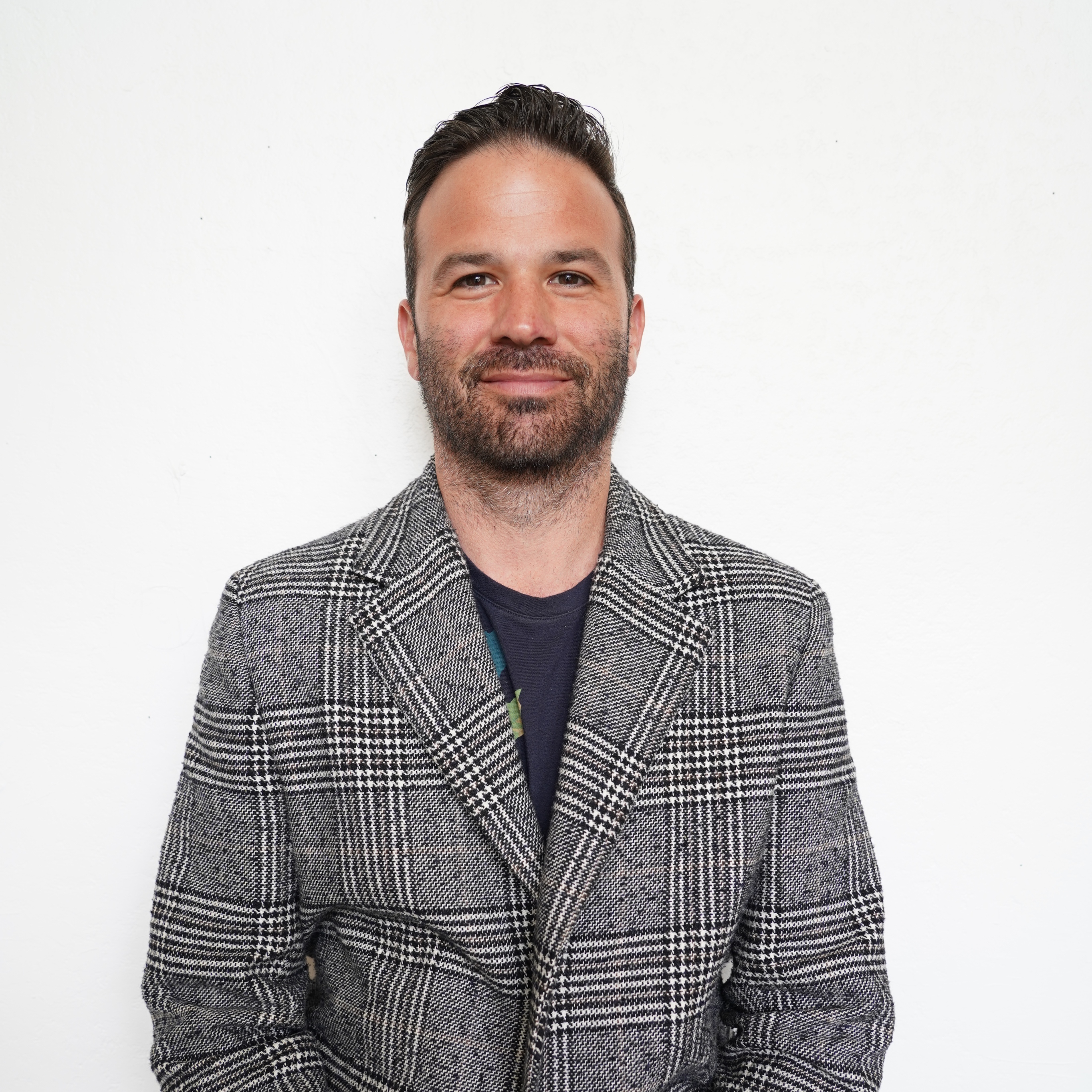
Adam Boggs is a seventh-year Ph.D candidate and interdisciplinary artist, scholar, educator and Urban Humanist. His research and teaching interests include the tension between creativity and automation, craft-based epistemologies, and the social and material history of architecture at the U.S.-Mexico border. He holds a BFA in Sculpture Cum Laude from the Ohio State University, and an MFA in Visual Art from the State University of New York at Purchase College. Prior to joining the doctoral program at UCLA he participated in courses in Architecture (studio and history) at Princeton University and Cornell University. His dissertation analyzes the history of indigenous labor during the Mexican baroque period to form a comparative analysis with the 20th century Spanish revival architecture movement in Southern California and how the implementation of the style along the U.S.-Mexico border might function as a Lefebvrian “thirdspace” that disrupts binary thinking. In Spring 2024 he taught an undergraduate seminar course at AUD on the history of architecture at the U.S.-Mexico border as part of the CUTF program.
Hanyu Chen

Hanyu Chen is a third-year doctoral student at UCLA AUD. Her research focuses on the intersection between (sub)urban studies, heritage conservation, and the genders of the space. Specifically, it concerns the dynamics of genders in (sub)urban areas and how these dynamics are conserved as heritage. Born and raised in China for her first 18 years, Hanyu chose the conservation of comfort stations in China as her master's thesis at the University of Southern California, where she earned her master’s degree in Heritage Conservation and officially started her journey in architecture. Her thesis discusses the fluidity and genders of comfort stations and how they survive in contemporary China’s heritage conservation policies.
Hanyu also holds a Bachelor of Science degree in AMS (Applied Mathematics and Statistics) and Art History from Stony Brook University.
Yixuan Chen

Yixuan Chen is an architectural designer and a second-year doctoral student in the Department of Architecture and Urban Design at UCLA. Driven by an impulse to demystify both the grand promises and trivial familiarities of architecture, her research embarks on the notion of everydayness to elucidate the power dynamics it reveals. She investigates the conflicts between these two ends and focuses on modernization across different times and places.
Prior to joining UCLA AUD, she was trained as an architect and graduated from the University of Nottingham's China Campus with a first-class honors degree. Her graduation project “Local Culture Preservation Centre,” which questioned the validity of monumental architecture in the climate crisis, was nominated for the RIBA President's Medal in 2016.
She also holds a Master of Arts degree with distinction in Architectural History from the Bartlett School of Architecture, University College London. Her dissertation, “Shijing, on the Debris of Shijing,” explores the vanishing shijing places, or urban villages, where rural migrant workers negotiate their urban identity in Chinese cities, revealing shifting power relations. Additionally, she authored an article in Prospectives Journal titled "Architectural Authorship in ‘the Last Mile,’" advocating for a change to relational architectural authorship in response to the digital revolution in architecture.
Pritam Dey
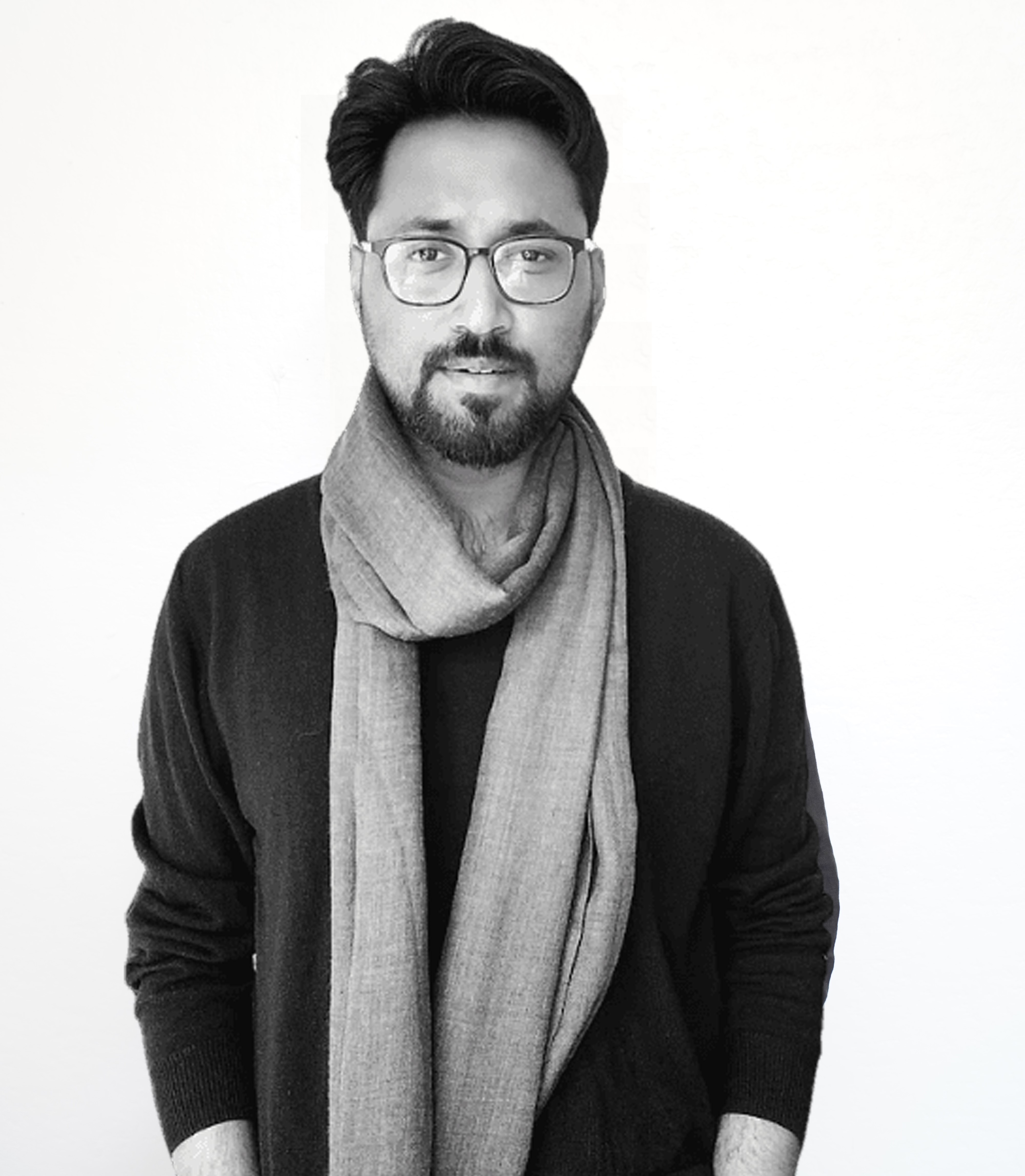
Pritam Dey is a doctoral candidate in Architectural History at UCLA and an urban designer trained at the School of Planning and Architecture, Delhi. His dissertation investigates how architecture in the Bengal Delta, during the late twentieth century, operated as a mutable instrument of ecological governance, primarily analyzing the role of two institutions-UNESCO and UN-FAO.
Dey's past research has examined crematoria as somatic architectures (presented at the World Architecture Congress, Seoul, 2017), and the role of informal and wholesale markets in shaping Indian city cores, including collaborative exhibitions with ENSAPLV in Paris and Kolkata. His work on the legal geographies of slums at Dharavi, Mumbai was published in McGill’s GLSA Research Series (2021), and his design training at the School of Planning and Architecture, Delhi, was supported by a Design Innovation Center Fellowship for habitat design in Himalayan villages.
Carrie Gammell

Carrie Gammell is a doctoral candidate working at the intersection of architectural history, property law, and political economy. Her research focuses on claims, investments, and intermediary organizations in the United States, from the Homestead Act of 1862 to the Housing Act of 1934.
Carrie is also a Senior Research Associate at cityLAB UCLA, where she studies state appropriations for California community college student housing. In the past, she contributed to Education Workforce Housing in California: Developing the 21st Century Campus, a report and companion handbook that provides a comprehensive overview of the potential for land owned by school districts to be designed and developed for teachers and other employees.
Prior to joining AUD, Carrie worked as an architectural designer in Colombia and the United States, where she built a portfolio of affordable housing, multi-family residential, and single-family residential projects as well as civic and cultural renovations and additions. She holds a Bachelor of Architecture from Rice University and a Master in Design Studies (Critical Conservation) from the Harvard Graduate School of Design.
Anirudh Gurumoorthy
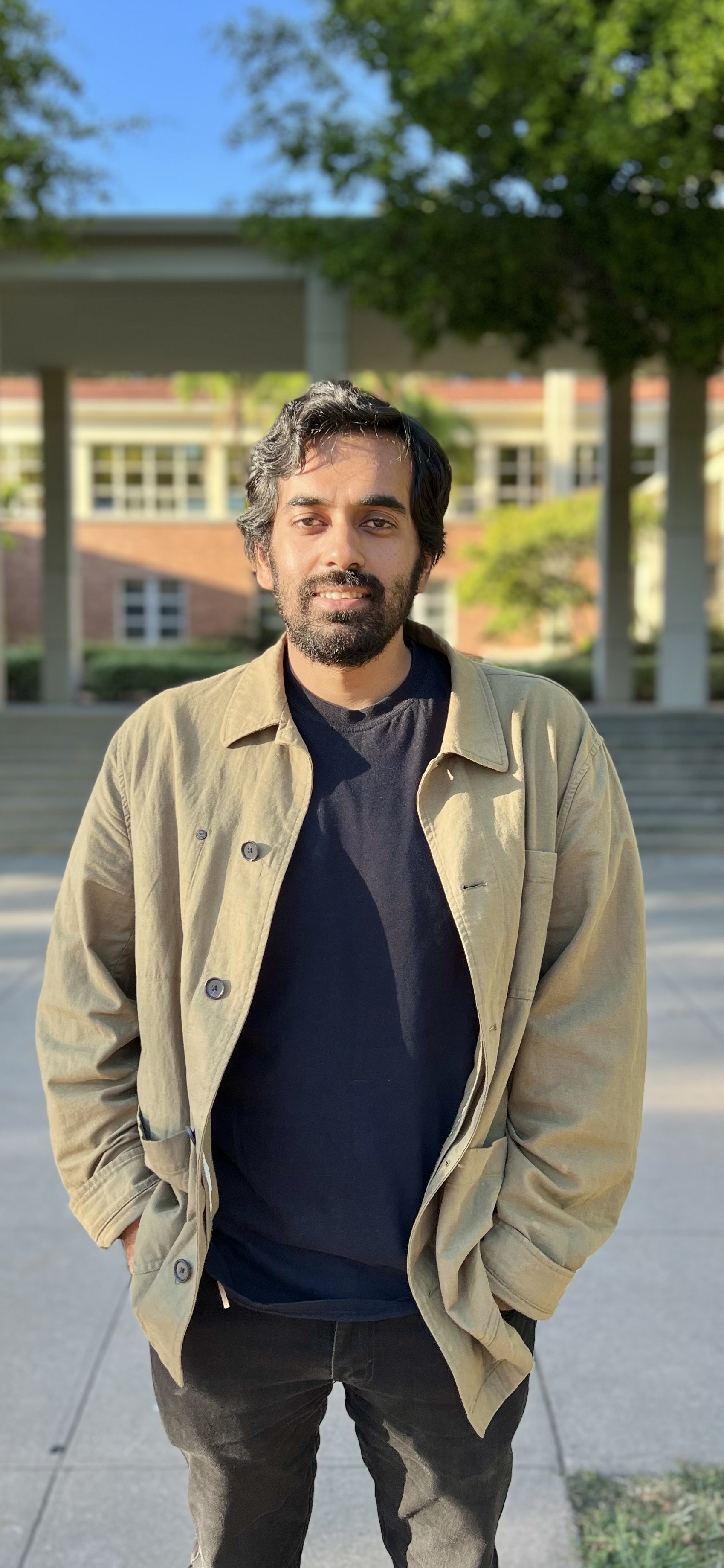
Anirudh Gurumoorthy is a PhD candidate at UCLA AUD. His dissertation, tentatively titled (Un)Certain Tropics and the Architecture of Certain Commodities, 1803-1926, focuses on the spatial and environmental histories of natural history/sciences in the long-nineteenth century as it related to the political economy of empire within South Asia. He is interested in the ways the materiality of commodity extraction and production contends with how, where, and why certain ‘tropical’ animals, vegetables, and minerals are attributed with a metropolitan sense of ‘value’. Moving from the United States to Britain (and back) through various parts of the Indian Ocean world as markets for singular forms of ice, rubber, and cattle form, peak, and collapse, the dissertation ultimately aims to reveal interconnected spatial settings of knowledge, control, regulation, display, and labor where knowledge systems, technical limits, human and nonhuman action/inaction, differentiated senses of environments and value continually contend with each other to uphold the fetishes of the world market. Gurumoorthy holds a B.Arch. from R.V. College of Architecture, Bangalore, and an M.Des in the History and Philosophy of Design and Media from the Harvard Graduate School of Design.
Chi-Chia Hou
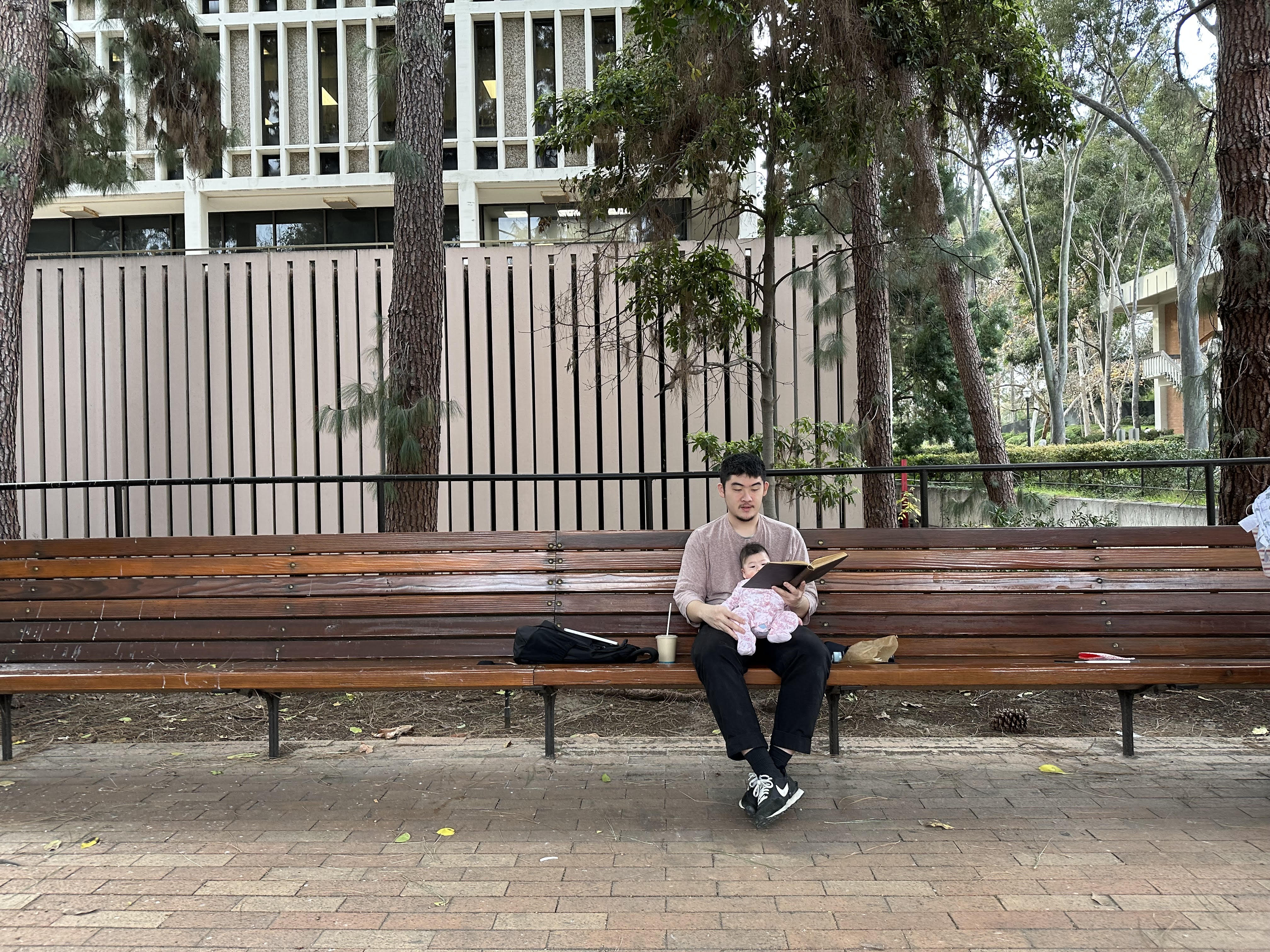
Chi-Chia Hou is a doctoral candidate in his sixth year at UCLA AUD. His working dissertation, “New Frontier: Architecture and Service 1893-1960,” explores his interest in architecture and wealth, changing ideas of profit and management, and social scientific discourses for measuring work and worker, self and others, and values of landed property.
His research locates moments of theorizing methodologies to manage income-generating properties in schools of agriculture, home economics, and hotel studies. The schools taught their students theories, while instilling the imminence of faithful direction of oneself, of self-as-property. The pedagogies, existing beyond the purview of Architecture, were of immense architectural consideration.
Chi-Chia Hou took a break from school in the previous academic year to learn from his daughter and has now returned to school to learn from his brilliant cohorts.
Adam Lubitz

Adam Lubitz is an urban planner, heritage conservationist, and doctoral student. His research engages the intersection of critical heritage studies and migration studies, with an emphasis on how archival information can inform reparations. His community-based research has been most recently supported by the Columbia GSAPP Incubator Prize as well as the Ziman Center for Real Estate and Leve Center for Jewish Studies at UCLA.
Prior to joining AUD, Adam worked at World Monuments Fund within their Jewish Heritage Program, and taught GIS coursework at Barnard College. His master's thesis applied field research with experimental mapping techniques in the old town of a municipality in Palestine. Adam holds MS degrees in Historic Preservation and Urban Planning from Columbia University and a BA in Urban Studies from New College of Florida.
José Monge

José Monge is a PhD candidate in the Department of Architecture and Urban Design. His dissertation, titled Maritime Labor, Candles, and the Architecture of the Enlightenment (1750-1872), focuses on the role that whale-originated illuminants, specifically spermaceti candles and oil, played in the American Enlightenment as an intellectual project and the U.S. as a country. By unravelling the tension between binaries such as intellectual and manual labor–the consumers that bought these commodities and the producers that were not able to afford them–the project understands architecture as a history of activities that moved from sea to land and land to sea, challenging assumptions about the static “nature” of architecture.
Kurt Pelzer

Kurt Pelzer is a fifth-year PhD candidate at UCLA AUD. Their research explores the relational histories, material flows, and politics of land in and beyond California in the long nineteenth century during the United States parks, public lands, and conservation movements.
Their current scholarship traces the settler possession and exhibitionary display of a Giant Sequoia (Sequoiadendron giganteum) in the 1850s; an act that contested the ways Miwok peoples ancestral to California's Sierra Nevada knew and related to life and land. Their broader interests include histories of colonialism and capitalism in the Americas, environmental history, and Blackness and Indigeneity as a methodological analytic for political solidarities and possibilities.
Prior to arriving at UCLA, Pelzer worked at the San Francisco Museum of Modern Art in the Architecture and Design Curatorial Department participating in exhibitions, programming, and collections work. Pelzer completed a Master of Advanced Architectural Design in the History, Theory, and Experiments program from California College of the Arts in San Francisco, and earned their Bachelor's degree in Landscape Architecture from the College of Design at Iowa State University.
Shota Vashakmadze
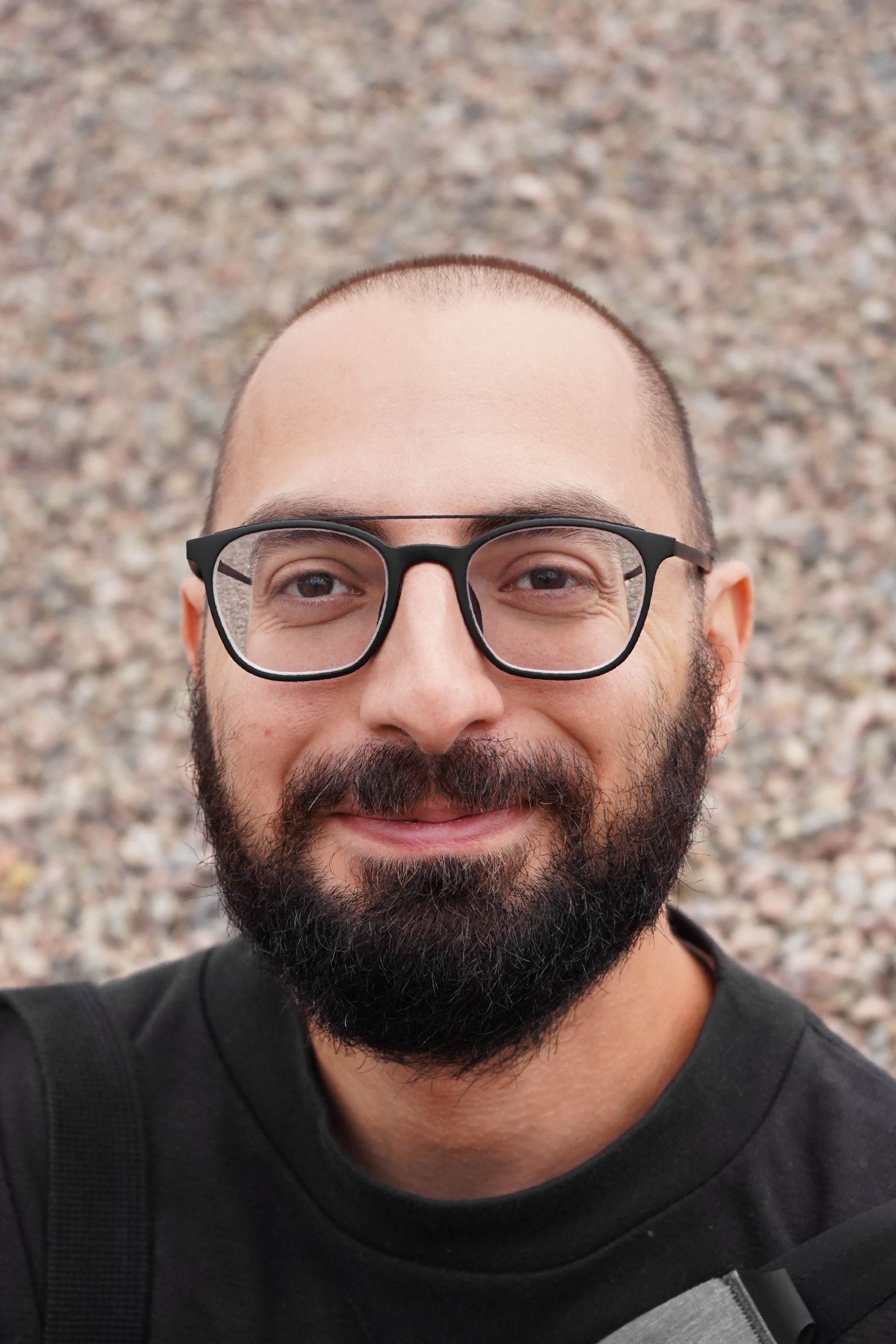
Shota Vashakmadze is a seventh-year PhD candidate at UCLA AUD. His dissertation traces the conjoined histories of architectural computing, environmental design, and professional practice in the late 20th century, adopting critical approaches to architecture’s technical substrates—the algorithms, softwares, and user protocols of computation—to examine their social and political dispositions. In his scholarship and pedagogy, he aims to situate forms of architectural labor within the profession’s ongoing acculturation to environmental crisis. Most recently, he has been leading the development of the interdisciplinary “Building Climates” cluster, a year-long course sequence at UCLA, and co-organizing an initiative dedicated to fostering discourse on climate change and architecture, including a two-day conference entitled “Architecture After a Green New Deal.”
His research has been supported by the Canadian Centre for Architecture and appeared in journals including Architectural Theory Review, The Avery Review, and Pidgin Magazine. He is currently completing a contribution to a collection on landscape representation and a chapter for an edited volume on architecture, labor, and political economy.
Shota holds an MArch from Princeton University and has a professional background in architecture, landscape, and software development. Before coming to UCLA, he researched methods for designing with point cloud data and wrote Bison, a software plugin for landscape modeling.
Alexa Vaughn
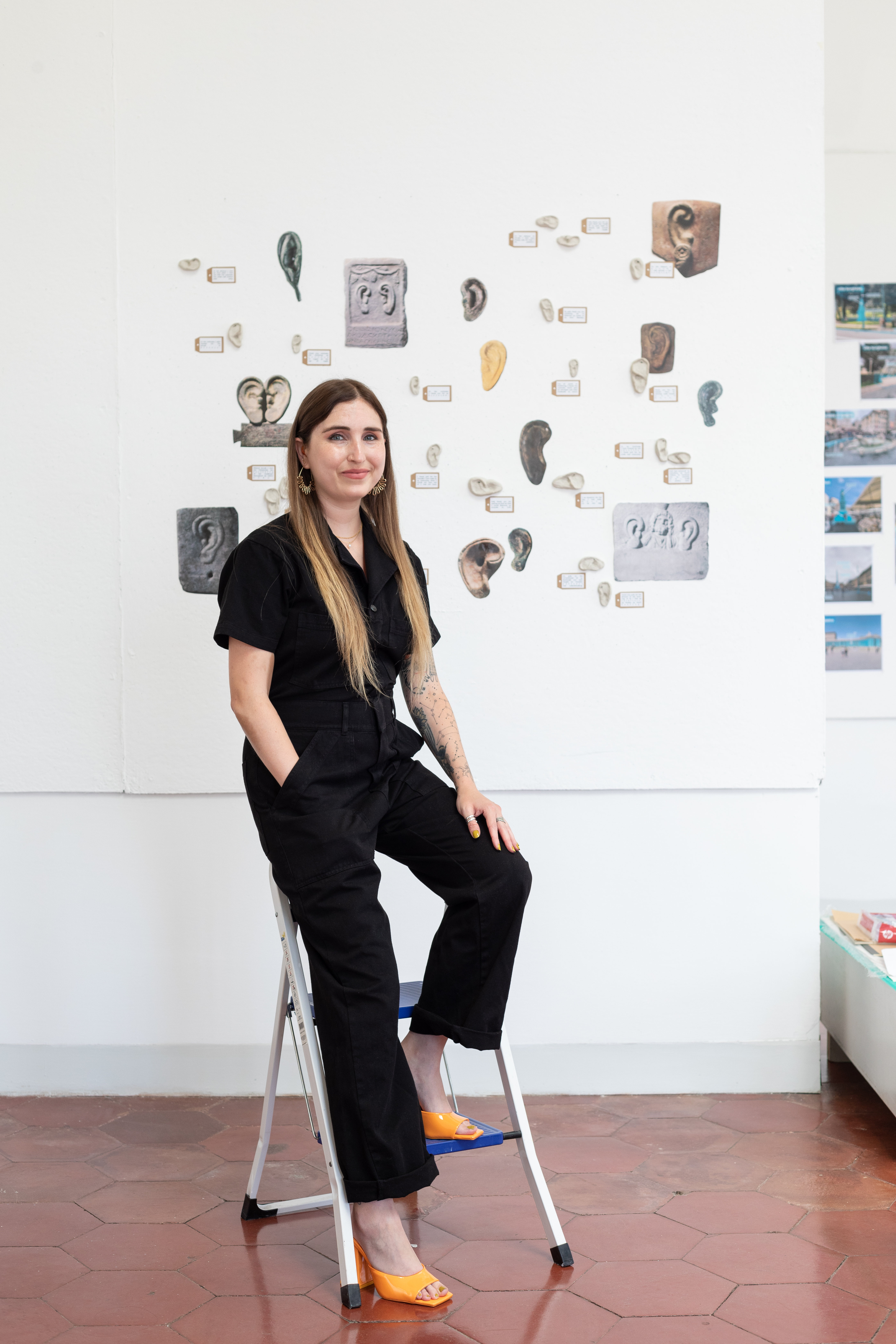
Alexa Vaughn (ASLA, FAAR) is a second-year PhD student in Architecture + Urban Design and a Eugene V. Cota-Robles Fellow, from Long Beach, California. She is a Deaf landscape designer, accessibility specialist, consultant, and recent Fellow of the American Academy in Rome (2022-23). She is a visionary speaker, thought leader, prolific writer and researcher, and the author of “DeafScape: Applying DeafSpace to Landscape,” which has been featured in numerous publications.
Her professional work is centered upon designing public landscapes with and for the Deaf and disabled communities, applying legal standards and Universal Design principles alongside lived experience and direct participation in the design process. She is an expert in designing landscapes for the Deaf community (DeafScape) and in facilitation of disabled community engagement. Prior to joining the A+UD program, Alexa worked for several landscape architecture firms over the course of six years, including OLIN and MIG, Inc.
Through a disability justice lens, her dissertation will seek to formally explore the historical exclusionary and inaccessible design of American urban landscapes and public spaces, as well as the response (activism, policy, and design) to this history through the present and speculative future. She will also actively take part in activist- and practice-based research with cityLAB and the Urban Humanities Institute.
Alexa holds both a BA in Landscape Architecture (with a minor in Conservation and Resource Studies) and a Master’s degree in Landscape Architecture (MLA) from the University of California, Berkeley, with specialization in accessible and inclusive design. Much of her work can be found at www.designwithdisabledpeoplenow.com and on Instagram: @DeafScape.
Yashada Wagle
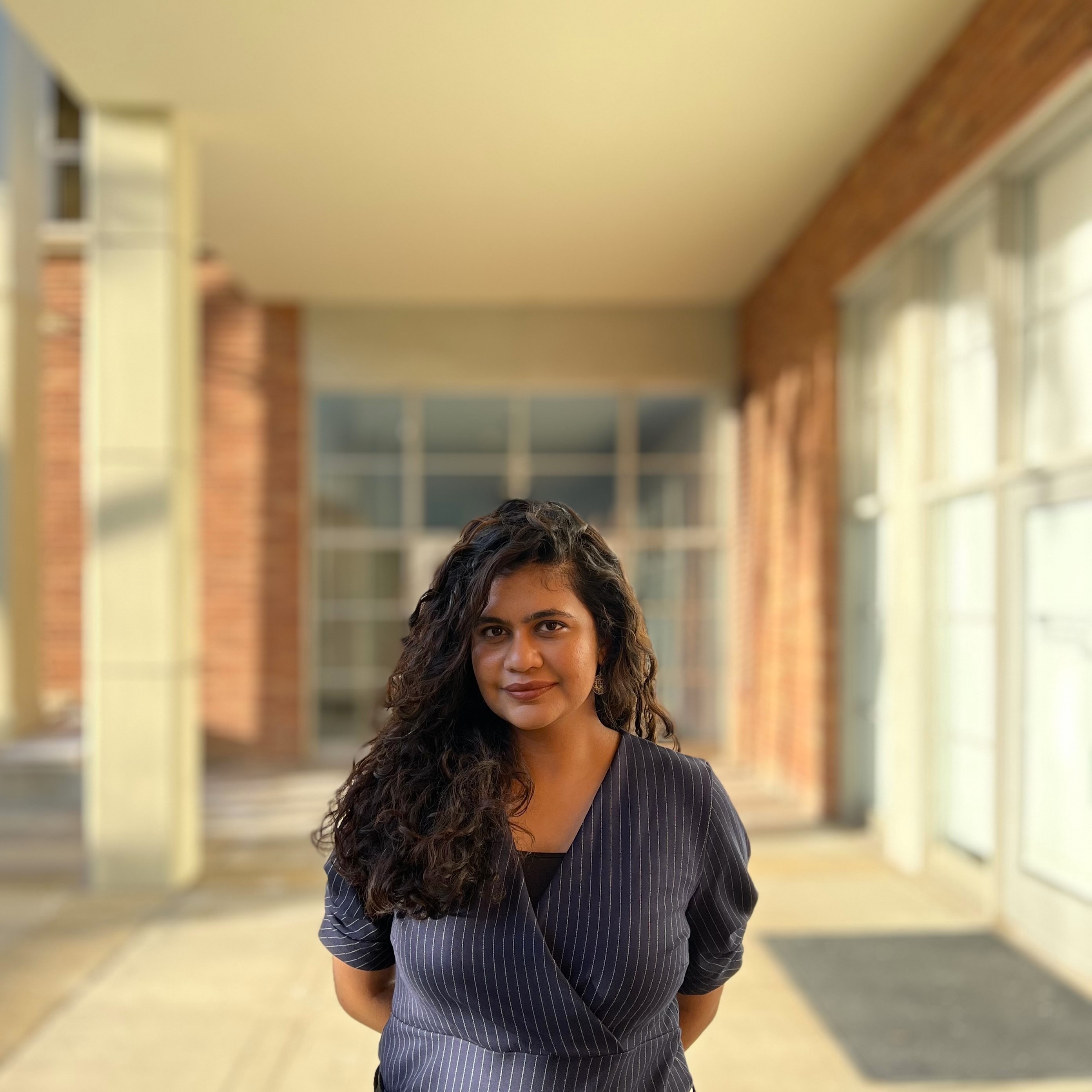
Yashada Wagle is a fourth-year PhD student in Critical Studies at UCLA AUD, and a recipient of the department's Moss Scholarship. Her research focuses on imperial environmental-legislative regimes in British colonial India in the late nineteenth century. She is interested in exploring questions around the histories of spaces of extraction and production as they network between the metropole and the colony, and their relationship with the conceptions of laboring bodies therein. Her master's thesis focused on the Indian Forest Act of 1865, and elucidated the conceptualization of the space of the ‘forest’ through the lenses of its literary, legislative, and biopolitical trajectories, highlighting how these have informed its contemporary lived materiality.
Wagle holds a Bachelor in Architecture (BArch) from the Savitribai Phule Pune University in India, and a Master in Design Studies (History and Philosophy of Design and Media) from the Harvard Graduate School of Design. She was previously a Research Fellow at the Kamla Raheja Vidyanidhi Institute for Architecture and Environmental Studies (KRVIA) in Mumbai, India.
In her spare time, Wagle enjoys illustrating and writing poetry, some of which can be found here.
Dexter Walcott

Dexter Walcott is a registered architect and PhD candidate in the Critical Studies of Architecture program at UCLA. His dissertation is a history of the origins of architectural practice in the United States through a study of superintendency prior to the Civil War. His research focuses on architecture as an agent of change by situating the production of the built environment into systems of exchange, material, and labor. From experience in architectural work and social movements, Dexter is dedicated to the development of students who can integrate the potential of design and the political and economic realities of construction with their role as civic and social actors to interrogate and change their fields. He was the National Organizer and a board member for the Architecture Lobby (2018-2020). Dexter co-organized the “Architecture After a Green New Deal” conference at UCLA in 2023. He holds a Bachelors of Architecture (BArch) from the Pratt Institute.
Dissertation Title and Description:
Superintending labor in “this guilty land”: How architectural practice built the industrial economy of the United States, 1844–1861.
The story of how architects defined work and oversaw construction at three critical sites of investment—steamboats, textile mills, and armories—during the Age of Jackson and into the Civil War.
Joy Zhu

Born and raised in Hong Kong, Joy is a fifth-year PhD student in architecture history. Her research explores geology as antiquity from early 19th – 20th century British colonial Hong Kong and China. She holds a B.A. in Comparative Literature with a focus in German from Middlebury College in 2017, and is a graduate of The New Normal program at Strelka Institute, Moscow in 2018. Previously, she has taught in the Department of Architecture at University of Hong Kong, as well as the Department of Design at Hong Kong Polytechnic University.
After working as a curatorial assistant at Tai Kwun Contemporary in 2019, she has continued the practice of art writing and translation, collaborating with many local Hong Kong artists as well as international curators such as Raimundas Malašauskas. In her spare time, she practices long-distance open water swimming. In 2022, she completed a 30km course at the South of Lantau Island, Hong Kong.
Admissions
The MA and PhD programs welcome and accept applications from students with a diverse range of backgrounds. These programs are designed to help those interested in academic work in architecture develop those skills, so we strongly encourage that you become familiar with fundamental, celebrated works in the history and theory of architecture before entering the program.
Applicants to the academic graduate programs must hold a Bachelor’s degree, or the foreign equivalent. All new students must enter in the fall quarter. The program is full-time and does not accept part-time students.
Applications for the MA and PhD programs (Fall 2026 matriculation) will be available are due January 6, 2026; please revisit this page for updates. Accepted candidates who wish to enroll must file an online Statement of Intent to Register (SIR) by April 15, 2026.
How to Apply
Applying to the MA and PhD programs is an online process via the UCLA Application for Graduate Admission (AGA).
Completing the requirements will take some time, so we strongly recommend logging in to the AGA in advance to familiarize yourself with the site and downloading the documents and forms you will need to complete your application.
You can also download this checklist to make sure you have prepared and submitted all the relevant documents to complete your application.
Your Statement of Purpose is a critical part of your application to the MA and PhD programs. It is your opportunity to introduce yourself and tell us about your specific academic background, interests, achievements, and goals. Our selection committee use it to evaluate your aptitude for study, as well as consideration for merit-based financial support.
Your statement can be up to 1500 words in length. Below are some questions you might want to consider. You don’t need to answer every question; just focus on the elements that are most relevant to you.
- What is your purpose in applying to the MA or PhD program? Describe your area(s) of research interest, including any areas of concentration and specialization.
- What experiences have prepared you for this program? What relevant skills have you gained from these experiences? Have your experiences led to specific or tangible outcomes that would support your potential to contribute to this field (e.g. performances, publications, presentations, awards or recognitions)?
- What other information about your past experience might help the selection committee in evaluating your suitability for this program? E.g. research, employment, teaching, service, artistic or international experiences through which you have developed skills in leadership, communication, project management, teamwork, or other areas.
- Why is UCLA Architecture and Urban Design the best place for you to pursue your academic goals?
- What are your plans for your career after earning this degree?
Your Personal Statement is your opportunity to provide additional information to help the selection committee evaluate your aptitude for study. It will also be used to consider candidates for UCLA Graduate Division fellowships related to diversity. You can read more about the University of California Diversity Statement here.
Your statement can be up to 500 words in length. Below are some questions you might want to consider. You don’t need to answer every question; just focus on the elements that are most relevant to you.
- Are there educational, personal, cultural, economic, or social experiences, not described in your Statement of Purpose, that have shaped your academic journey? If so, how? Have any of these experiences provided unique perspective(s) that you would contribute to your program, field or profession?
- Describe challenge(s) or barriers that you have faced in your pursuit of higher education. What motivated you to persist, and how did you overcome them? What is the evidence of your persistence, progress or success?
- How have your life experiences and educational background informed your understanding of the barriers facing groups that are underrepresented in higher education?
- How have you been actively engaged (e.g., through participation, employment, service, teaching or other activities) in programs or activities focused on increasing participation by groups that have been historically underrepresented in higher education?
- How do you intend to engage in scholarly discourse, research, teaching, creative efforts, and/or community engagement during your graduate program that have the potential to advance diversity and equal opportunity in higher education?
- How do you see yourself contributing to diversity in your profession after you complete your academic degree at UCLA Architecture and Urban Design?
A Curriculum Vitae (résumé of your academic and professional experience) is recommended but not required.
Applicants must upload a scanned copy of the official transcripts from each college or university you have attended both in the U.S. and abroad. If you are accepted into the program you will be required to submit hard copies. These can either be sent directly from each institution or hand-delivered as long as they remain in the official, signed, sealed envelopes from your college or university. As a general rule, UCLA Graduate Division sets a minimum required overall grade-point average of 3.0 (B), or the foreign equivalent.
As of this Fall 2023 cycle, the GRE is NOT required as part of your application to UCLA AUD. No preference will be given to those who choose to submit GRE scores as part of their application.
However, if you do take the GRE exam and wish to include it as part of your application: More information on this standardized exam can be found at www.ets.org/gre. In addition to uploading your GRE scores, please direct ETS to send us your official score sheets. Our ETS codes for the GRE are below:
UCLA Architecture and Urban Design
Institution Code: 4837
Department Code: 4401
We recommend you take the exam at least three weeks before the application deadline as it usually takes 2-3 weeks for ETS to send us the test scores.
If you have received a Bachelor’s degree in a country where the official language of instruction and primary spoken language of daily life is not English, you must submit either a Test of English as a Foreign Language (TOEFL) or an International English Language Testing System (IELTS). Exempt countries include Australia, Barbados, Canada, Ireland, Jamaica, New Zealand and the United Kingdom. This is a requirement that is regardless of your visa or citizenship status in the United States.
To be considered for admission to the M.Arch. program, international students must score at least a 92 on the TOEFL or a 7 on the IELTS exam. Because processing, sending, and receiving TOEFL and IELTS scores can take several weeks, international students must schedule their exam no later than October 31 in order to meet UCLA deadlines. TOEFL scores must be sent to us directly and uploaded as part of the online submission. Our ETS codes for the TOEFL are below:
UCLA Architecture and Urban Design
Institution Code: 4837
Department Code: 12
If your score is less than 100 on the TOEFL or 7.5 on the IELTS, you are also required to take the English as a Second Language Placement Examination (ESLPE) on arrival at UCLA. The results of this test will determine any English as a Second Language (ESL) courses you need to take in your first term of residence. These courses cannot be applied towards your minimum course requirements. As such, you should expect to have a higher course load than students not required to take ESL courses.
If you have earned a degree or completed two years of full-time college-level coursework in the following countries, your TOEFL / IELTS and ESLPE requirements will be waived: U.S., U.K., Canada (other than Quebec), Australia, and New Zealand. Please provide official transcripts to demonstrate course completion. Unfortunately, we cannot accept any other documentation to demonstrate language proficiency.
Three (3) letters of recommendation are required. These letters should be from individuals who are familiar with your academic and professional experiences and can evaluate your capacity to successfully undertake graduate studies at UCLA. If you do not have an architecture background please note that we are looking for letters that evaluate your potential as a graduate student, not necessarily your architecture experience.
Letters of recommendation must be sent electronically directly to UCLA by the recommender. When logged in, you can enter the name and email address of each of your recommenders. They will be contacted by email with a request to submit a letter on your behalf. You can track which letters have and have not been received. You can also send reminders to your recommenders to send their letters.
Writing samples should illustrate an applicant’s capacities for research, analytical writing and scholarly citation. Texts may include seminar papers, theses, and/or professional writing.
Please complete and submit the Department Supplement Form to confirm your intention to apply to the MA or PhD program.